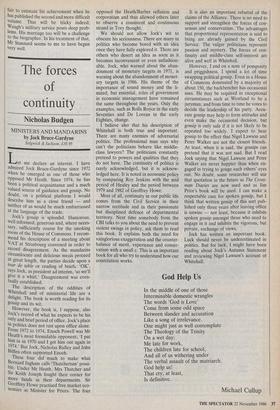The forces of continuity
Nicholas Budgen
MINISTERS AND MANDARINS by Jock Bruce-Gardyne
Sidgwick & Jackson, £10.95
Let me declare an interest. I have admired Jock Bruce-Gardyne since 1972 when he emerged as one of those who Opposed Mr Heath. Since 1974, he has been a political acquaintance and a much valued source of guidance and gossip. No doubt, on a political platform I would describe him as a close friend — and neither of us would be much embarrassed at the language of the trade. Jock's gossip is splendid. Humorous, well informed, generous and, where neces- sary, sufficiently coarse for the smoking room of the House of Commons. I recom- mend his description of a meeting about VAT at Strasbourg convened in order .to record disagreement. As the mandarins circumlocute and delicious meals proceed at great length, the parties decide upon a tour de table or reading of briefs. 'OK', says Jock, as president ad interim, 'so we'll give it a whirl.' Disagreement was even- tually established.
The description of the oddities of Whitehall and of ministerial life are a delight. The book is worth reading for its gossip and its wit.
However, the book is, I suppose, also Jock's record of what he expects to be his only and brief period of office. Jock's place in politics does not rest upon office alone. From 1972 to 1974, Enoch Powell was Mr Heath's most formidable opponent; 'I put him in in 1970 and I got him out again in 1974.' But Jock, Nicholas Ridley and John Biffen often supported Enoch. These four did much to make what Bernard Ingham calls `Thatcherism' possi- ble. Under Mr Heath, Mrs Thatcher and Sir Keith Joseph fought their corner for more funds in their departments. Sir Geoffrey Howe practised free market eco- nomies as Minister for Prices. The four opposed the Heath/Barber reflation and corporatism and thus allowed others later to observe a consistent and continuous strand in Tory thought.
We should not allow Jock's wit to obscure his seriousness. There are many in politics who become bored with an idea once they have fully explored it. There are others who desert an idea as soon as it becomes inconvenient or even unfashion- able. Jock, who warned about the aban- donment of monetary targets in 1971, is warning about the abandonment of monet- ary targets in 1986. His theme of the importance of sound money and the li- mited, but essential, roles of government in economic management have remained the same throughout the years. Only the examples, such as Rolls Royce in the early Seventies and De Lorean in the early Eighties, change.
I believe also that his description of Whitehall is both true and important. There are many enemies of adversarial politics. The professional man says why can't the politicians behave like middle- class lawyers? The politicians constantly pretend to powers and qualities that they do not have. The continuity of politics is rarely acknowledged, but it is acknow- ledged here. It is noted in economic policy by comparing Roy Jenkins with the mid period of Healey and the period between 1979 and 1982 of Geoffrey Howe.
Most of all, continuity in our publiC life comes from the Civil Service in their narrow rectitude and in their passionate but disciplined defence of departmental territory. Next time somebody from the CBI talks to you about the need to prevent violent swings in policy, ask them to read this book. It explains both the need for vainglorious exaggeration and the counter- balance of merit, experience and conser- vatism with a small c. This is an important book for all who try to understand how our constitution works. It is also an important rebuttal of the claims of the Alliance. There is no need to support and strengthen the forces of con- sensus and conservatism. The advantages that proportional representation is said to bring are already gained by the Civil Service. The vulgar politicians represent passion and mystery. The forces of con- tinuity and middle-class self-interest are alive and well in Whitehall.
However, I end on a note of pomposity and priggishness. I spend a lot of time swapping political gossip. Even in a House of Commons dominated by a majority of about 150, the backbencher has occasional uses. He may be required in exceptional circumstances such as Westland to be a juryman, and from time to time he votes to decide the leadership of his party. Accu- rate gossip may help to form attitudes and even make the occasional decision, but gossip is only safe if it is not likely to be repeated too widely. I expect to hear gossip to the effect that Nigel Lawson and Peter Walker are not the closest friends. At least, when it is said, the gossips can pretend that it was not said. But I read Jock saying that Nigel Lawson and Peter Walker are never happier than when en- gaged in trying to gouge each others' eyes out. No doubt, some researcher will use that quotation in the future as The Cross- man Diaries are now used and as Jim Prior's book will be used. I can make a respectable case for spoken gossip, but I think that written gossip of this sort pub- lished only three years after leaving office is unwise — not least, because it inhibits spoken gossip amongst those who need to engage in it and inhibits the vigorous, but private, exchange of views. Jock has written an important book. Luck should never be underestiMated in politics. But for luck, I might have been reading about Jock's Autumn Statement and reviewing Nigel Lawson's account of Whitehall.


























































 Previous page
Previous page